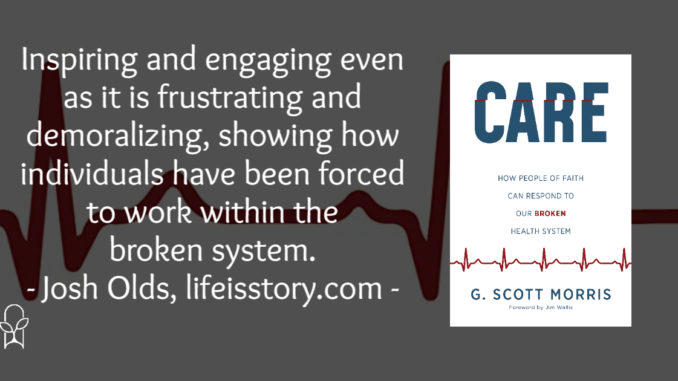
Published by Eerdmans on October 27, 2022
Genres: Healthcare, Non-Fiction
Buy on Amazon
Goodreads

Our health system doesn’t work for the most vulnerable. It’s time for people of faith to respond with concrete action to demonstrate God’s love and effect real change. Here’s how.
The dialogue on how to fix US health care is mired in partisan policy debates. Rather than idly waiting for the gridlock to resolve, people of faith can live into their call to care for the underserved right now. Drawing from his experience as medical doctor, pastor, and founder and CEO of the nation’s largest charitably funded faith-based health-care center, Scott Morris sheds light on how we can live out a crucial aspect of discipleship by ministering to the vulnerable and underserved among us.
Through the stories of people too often ignored or dehumanized, Dr. Morris addresses the financial and social barriers to health care for low-income and undocumented individuals, the lack of affordable medications, the challenges of chronic disease and behavioral health issues, and the promising outcomes of faith-based care that treats the whole person. As we continue to reckon with the effects of the Covid-19 pandemic and the inequities in our health systems it has highlighted, Dr. Morris’s book calls readers to awareness, action, and advocacy in their local communities on behalf of those who have no one else to turn to for quality care.
The American healthcare system is broken. Whether it’s insurance being tied to employment, high deductibles, lack of access to services, refusal of coverage even if you have insurance, long wait times, or any other of the hundreds of systemic problems with the for-profit healthcare system, the diagnosis is certain: it’s dying and it’s terminal. In Care: How People of Faith Can Respond to Our Broken Health System, Dr. G. Scott Morris shares stories of his experience as founder and CEO of Church Health, a faith-based healthcare center in Memphis.
Care succeeds if you see it as a memoir of Morris’s work. He shares stories from decades in the trenches of offering free and reduced-price healthcare, cajoling doctors and hospitals into donating time and resources, going from doctor to doctor to collect medicine samples to provide for those in need, and meeting with people who came to his clinic without much hope of being healed. The stories that he shares are intended to be shocking but they’re so common that nothing Dr. Morris shared surprised me.
He tells the story of doing the legwork (pun intended) to get a client a completely free knee replacement surgery. Donated artificial joint, donated time from the surgeon, donated facility, the works. The guy can’t do it because he can’t afford to be off work for the recovery period. This story should illustrate the point that mere charity within the current healthcare system isn’t sufficient for fixing the system. While Care sort of goes down that path, Morris’s solution to fixing the healthcare system appears to be to continue to subvert and work within the current system rather than consider any other alternative.
As a memoir, Care is a well-told account of a doctor who has devoted his life to providing healthcare to the poor. As a blueprint for responding to the broken healthcare system, it feels insufficient. While I can appreciate Dr. Morris’s work and do think that it is an element of responding to the healthcare crisis, all the book does is show how to respond to critical care, rather than addressing the root of the problem. Dr. Morris’s job has always been dealing with problems after they were problems, but what if we did some preventative work? Not just to our health, but our entire healthcare system? That element is missing from the book. In the end, reading Care as a memoir is inspiring and engaging even as it is frustrating and demoralizing, showing how individuals have been forced to work within the broken system. Reading it as a way of responding to our broken health system, it is incomplete. While I commend Dr. Morris’s work, I think our response to the broken system has to be greater than just pulling people out of the river—we have to determine why they’re drowning in the first place.
